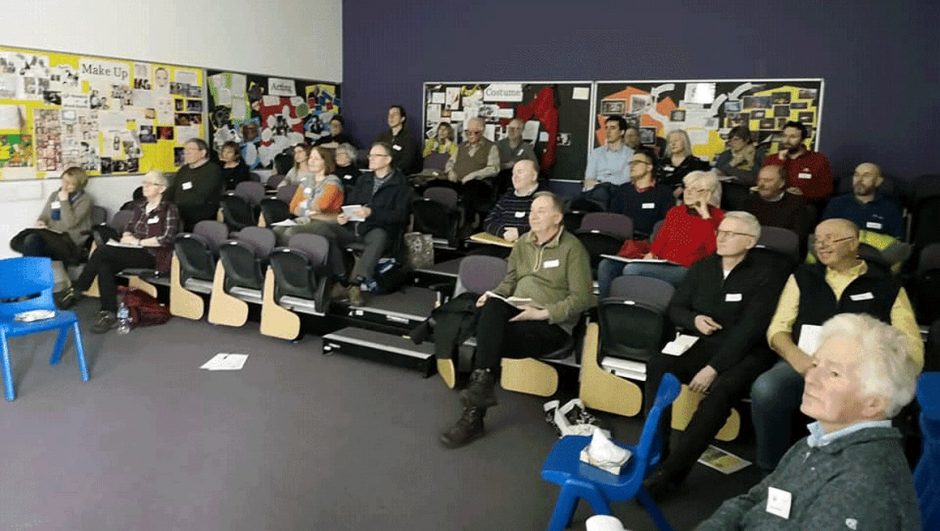Loch Leven Community Campus, Muir, Kinross – 14 March 2020
By Justine Swinney
Thanks to everyone who attended our Annual meeting on 14 March at the Loch Leven Community Campus in Muir, Kinross. Considering the uncertain situation we were in just nine days before the full Covid-19 lockdown, we had an impressive turnout; and thank you to everyone for following the guidance at that time in terms of vigilant handwashing etc.
Jo Widdicombe, President of BIBBA (Bee Improvement and Bee Breeders Association) valiantly journeyed up from Cornwall and gave us two inspiring talks on bee improvement (read more about Jo’s presentation here).
David Evans, who graciously stepped into the breach, when Keith Pierce reluctantly decided to stay safe at home in Ireland, gave us a fascinating talk, entitled “Who’s the Daddy?”, where he discussed the importance of polyandry – the mating of a queen with multiple (12-19) drones – and hyperpolyandry – the mating of a queen with 30+ drones – on colony health. He then described the prevalence of rare patrilines in emergency queens, compared to those in worker bees and queens raised in supersedure and swarm situations. You can find more detail on this topic in David’s website, and in Gavin Ramsay’s article in the last SNHBS newsletter. There was some interesting discussion about the potential implications of this evidence in queen rearing activities. David pointed out that, although the evolutionary benefits of selecting rare patrilines in emergency queens are not clear, the fact that it happens repeatedly, suggests that there are evolutionary benefits!
A new board was voted in during the membership meeting:
- Gavin Ramsay, Chair
- John Durkacz, Deputy Chair
- Margaret Packer, Membership
- Sandy Scott, Fundraising
- Alastair Sharp
- David Morland (new)
- Tracy Robinson (new)
Kate Atchley, Helena Jackson, Dawn Rigby and Justine Swinney will be stepping down and vacancies remain open for the Secretary and Newsletter Coordinator positions. If you would like to join the trustees, take on one of these positions and help steer SNHBS’ direction, please reach out to us via secretary@SNHBS.scot.
Finally, we had some very valuable discussion about what members would like SNHBS to be doing. Thanks to everyone for their willingness to make suggestions and for the open dialogue. Members appreciate the reality of shortages of Amm stocks and the limits this poses on progress. Many of the suggestions centred around activities we could work on in the meantime, until Amm stocks build up. These included:
- Help members build skills, such as queen rearing and new queen introductions.
- Set up networking between bee breeding groups, by holding periodic video meetings to discuss specific topics and to share general learnings.
- Consider opportunities to improve the best available stocks in areas where purity is currently an unrealistic aim.
- Conduct a roadshow, visiting local beekeeping associations, to promote what SNHBS does and to dispel a few myths, namely:
- that native bees are ill-tempered
- that beekeepers in built-up areas cannot contribute to SNHBS’ aims: they can still get involved in local bee improvement.
- that queen rearing is the domain of only the most experienced beekeepers: if you can do swarm control you can do queen rearing!
- Find ways to encourage more new members
The trustees have begun and will continue to discuss these suggestions at our board meetings and build them into SNHBS plans for the next year. We’ll share more as thoughts evolve. If you have a particular passion about anything on the list and would like to be involved in, or even lead a team to make things happen, please reach out to us via secretary@snhbs.scot.
Thanks again to everyone who attended: we hope you all enjoyed it and are feeling inspired about the new bee season.

